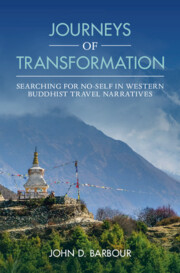Book contents
- Journeys of Transformation
- Reviews
- Journeys of Transformation
- Copyright page
- Dedication
- Contents
- Acknowledgments and Author’s Note
- Introduction A Literary Genre and Some Questions about Self-Transformation
- Chapter 1 The Origins of the Genre
- Chapter 2 Peter Matthiessen’s The Snow Leopard and Nine-Headed Dragon River
- Chapter 3 In a Zen Monastery
- Chapter 4 Thomas Merton and Christian and Jewish Pilgrims in Buddhist Asia
- Chapter 5 Walking the Dharma on Shikoku and in India
- Chapter 6 Trekking and Tracking the Self in Tibet
- Chapter 7 Life-Changing Travels in the Tibetan Diaspora
- Chapter 8 Encounters with Theravada Buddhism
- Chapter 9 Searching for Chan Buddhism after Mao
- Conclusion Theories of No-Self, Stories of Unselfing, and Transformation
- Bibliography
- Index
Conclusion - Theories of No-Self, Stories of Unselfing, and Transformation
Published online by Cambridge University Press: 12 March 2022
- Journeys of Transformation
- Reviews
- Journeys of Transformation
- Copyright page
- Dedication
- Contents
- Acknowledgments and Author’s Note
- Introduction A Literary Genre and Some Questions about Self-Transformation
- Chapter 1 The Origins of the Genre
- Chapter 2 Peter Matthiessen’s The Snow Leopard and Nine-Headed Dragon River
- Chapter 3 In a Zen Monastery
- Chapter 4 Thomas Merton and Christian and Jewish Pilgrims in Buddhist Asia
- Chapter 5 Walking the Dharma on Shikoku and in India
- Chapter 6 Trekking and Tracking the Self in Tibet
- Chapter 7 Life-Changing Travels in the Tibetan Diaspora
- Chapter 8 Encounters with Theravada Buddhism
- Chapter 9 Searching for Chan Buddhism after Mao
- Conclusion Theories of No-Self, Stories of Unselfing, and Transformation
- Bibliography
- Index
Summary
In five sections, this Conclusion correlates the features of Western Buddhist travel narratives with understandings of no-self. It reflects on what stories can show that is obscured by theories and explains the distinctive value of autobiographical narratives for interpreting no-self and experiences of unselfing. The theory developed builds on the ideas of Steven Collins, Ann Taves, John Hick, and others. Western narratives are compared to an eighteenth-century Tibetan autobiography as interpreted by Janet Gyatso. A fourth section reflects on why travel narratives often portray experiences of unselfing. Finally, a theory is proposed that links experiences of unselfing with autobiographical writing as related aspects of religious transformation. Self-transformation is the central theme of contemporary spiritual autobiography and the deepest religious concern at work in Buddhist thinking about no-self. Western Buddhist travel narratives offer crucial insights and wisdom about these matters.
Keywords
- Type
- Chapter
- Information
- Journeys of TransformationSearching for No-Self in Western Buddhist Travel Narratives, pp. 270 - 313Publisher: Cambridge University PressPrint publication year: 2022



